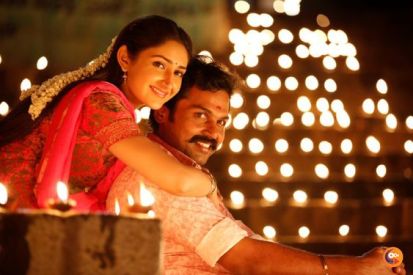A 1988 remake of a Hindi “remake” of Beverly Hills Cop, A Kodandarami Reddy’s Trinetrudu is pure mass with the minimum of logic and the maximum recommended allowance of biffo and heroics. Happy Megabirthday 2018!
The story opens with a CBI officer (Nagendra Babu) finding a secret lair in an ashram. DD (Kulbhushan Kharbanda) runs the ashram, and is using it as a cover for exporting “Brown Sugar” hidden inside corpses and, I think, harvesting organs for sale on the black market. A man in a spectacular jumpsuit – my heart leapt for an instant as I wondered if it was Chiru, the outfit is THAT good/bad – kills the officer and business goes on as usual. But the CBI is not done, and despite a frosty relationship with the local police they send another man, possibly their best or maybe not; Abhimanyu (Chiranjeevi). Abhimanyu seems not very good at following police processes, and technically he kidnaps his boss, so I do question his ongoing employment as a law enforcement officer. But he’s Chiru so they let him do what he wants. Evildoers and anyone with flimsy furniture beware!
It’s interesting to see the portrayal of drug culture. Abhimanyu heads to Goa and is met by a local police officer (Satynarayana Kaikala). On the drive home, they are surrounded by scraggly white backpacker types who chatter and shake the car, like super-sized monkeys, demanding money. But the addicts in the drama are children, including Abhimanyu’s little brother who overdosed and died, and his love interest Pratyusha’s little brother. Pratyusha (Bhanupriya) is a doctor or at least someone who wears a white coat and wanders around a hospital. And the hospital proves to be a critical piece of the puzzle as Abhimanyu closes in on DD and the body count starts to rise.
DD is a modern villain with lots of gadgets to help automate his lair and people management responsibilities. He sends disappointing gang minions down the slippery dip of doom, into a cage where their certain death awaits. It’s quite impressive. That jumpsuit guy must be sore and cranky if he’s usually suspended on a bungee in the cage, waiting to do his murderous thing. And what lair would be complete without snakes, and a remote controlled electrified bird cage to contain your adversaries.
Bhanupriya is in good form as Pratyusha. She gets to show a little more than just be a love interest although ultimately she is shuffled to the sidelines so Chiru can get on with being Chiru. But Pratyusha has a profession and family and ideas about her own life. I liked that Pratyusha had no truck with Abhimanyu’s pathetic attempts to engineer a meeting with her. She was quite happy to call him out or to call the local comedy police out to get rid of him. But once they compared notes on the various overdoses and murders, she realised he wasn’t just a weirdo and started having elaborate dance fantasies. And that unleashed the creativity of the wardrobe department.
Abhimanyu has a theme song that calls him Superman and Supreme Hero. There are fights and chases and dances and more fights and gadgets and snippets of ideas from Bond films and explosions and fights galore. All the signs point to Awesome. Chiru gets to do all the hero things in this role from suave ladies man to bumbling Clouseau-esque policeman to dashing stunts, daring escapes, and martial arts-ish fights.
While there is very little of realism in this film, I liked the touch of verisimilitude as Abhimanyu on stakeout looks bored and grumpy and stress eats bananas. And of course if someone bills themselves as a local Michael Jackson, look out – you’ve invited trouble!
There are some other excellent outfits, including this hat.
Sadly for Abhimanyu, the hat completely failed as a disguise and he ended up drugged and tied to the railway tracks. Adding insult to injury, he was rescued by Tony (Brahmi, with comedy teeth). But generally Abhimanyu gets himself into and out of hot water with no assistance required. The fight scenes are high on “Karate” and low on gravity. Perfect.
Abhimanyu swears a bit, and Chiru delivers every epithet with delightfully plummy tones, enunciating each syllable lovingly and loudly. “BASTARD!” is on high rotation and he really does roar. But you know how it goes. One minute you’re prancing around swearing with vim and vigour, next you’re hurtling down the doom tube to the thunder dome to fight to the death to save your patient Ma (Annapurna).
At just under 2 ½ hours Trinetrudu is a little over long. But what to cut? I couldn’t bear to see the balloon escape go….or the bungee fight….or the hospital anaesthetic scuffle…
There’s no doubt as to how Trinetrudu is going to end, but it’s quite the ride to get there! 3 ½ stars!






























































